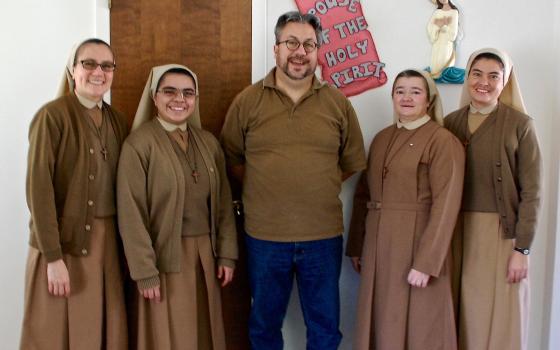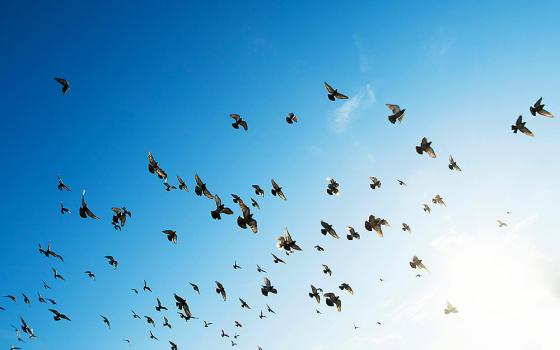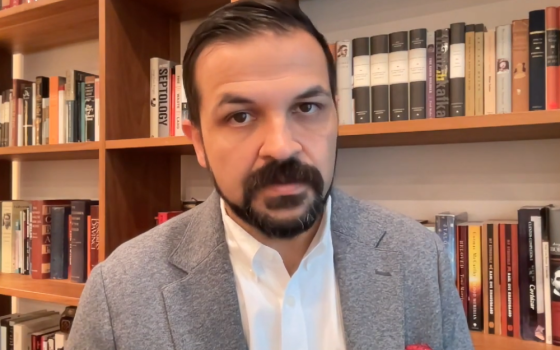Philadelphia Archbishop Charles Chaput appeared on the Notre Dame campus Thursday with a grim forecast of how democracy cracks amidst weak familial structures, and with reproof for his hosts' "baffling error in judgment" by honoring Vice President Joe Biden earlier this year.
In a speech that also chastised the Obama administration as deliberately interfering with civil institutions and made a peculiar observation about an increase in London babies named Muhammad, the soon-to-be 72-year-old archbishop foretold the bleak consequences of what happens to a society when infidelity and promiscuity run rampant and families break down -- already manifested in America, he said, evidenced through the thousands of confessions he's heard in his 46 years as a priest.
Chaput's comments came during the Notre Dame's annual Tocqueville Lecture on Religious Liberty, named after the French sociologist Alexis de Tocqueville who captured his observations of early 19th-century America politics and society in his book Democracy in America.
The archbishop offered observations of his own on modern American society in a speech titled "Sex, Family and the Liberty of the Church." The Philadelphia archdiocese sent the prepared remarks to journalists and published them on the archdiocesan website.
'A baffling error of judgment'
At its bookends was where Chaput waded into the current election season and reprimanded Notre Dame for presenting Biden in May with the Laetare Medal, first handed out in 1883 and recognized as the most prestigious award for American Catholics. The vice president received the honor along with former Speaker of the House John Boehner.
"For the nation's leading Catholic university to honor a Catholic public official who supports abortion rights and then goes on to conduct a same-sex civil marriage ceremony just weeks later, is -- to put it kindly -- a contradiction of Notre Dame's identity," Chaput said.
He continued: "It's a baffling error of judgment. What matters isn't the vice president's personal decency or the university's admirable intentions. The problem, and it's a serious problem, is one of public witness and the damage it causes both to the faithful and to the uninformed."
In August, Biden drew controversy after posting a picture on his Twitter account of himself officiating a civil marriage between two men who were longtime White House staff members. Days later, several bishops criticized the act as "a counter witness," though refrained from directly using the vice president's name or title.
Early in his 44-year political career, Biden opposed abortion measures, voting in 1982 for a constitutional amendment overturning Roe v. Wade; from the early 1990s through his election as vice president in 2008, he received uneven scores from reproductive rights groups. Ahead of last year's papal visit, Biden told America Magazine "Abortion is always wrong … But I'm not prepared to impose doctrine that I'm prepared to accept on the rest of [the country]."
On its webpage for the Laetare Medal, Notre Dame highlights Biden's work in the Senate on crime, violence against women and foreign relations, and as vice president his role overseeing the stimulus package following the 2008 recession.
Chaput said that his sharp words toward Biden and Notre Dame were meant less as criticism than encouragement. He praised the university for being "still deeply Catholic not just in its marketing, but in its soul," but at the same time pushed it to continually examine "the fundamental why of its mission," one he defined throughout the talk as creating a "different kind of people," who bring about change in society by first changing themselves.
Likewise, he challenged Notre Dame to be a different kind of university, one whose primary purpose is "to help you get into heaven," rather than prepare students for post-graduate degrees or the job market as a Catholic equivalent of Princeton, Stanford or Yale.
"What the Church needs now is a university that radiates the glory of God in age that no longer knows what it means to be human," he said.
People too weak to be free
Channeling his inner Tocqueville, Chaput opined on his observations of the state of U.S. society, based in part on more than 12,000 confessions he's heard of "the failures and hurts in people's lives."
"The confessional is more real than any reality show because nobody's watching," he quipped.
From that personal space, Chaput said he's detected a spike in people confessing sexual sins. The result has been "human wreckage," he said, in not only a culture often incapable of commitment and self-sacrifice, but also the political consequences of personal weakness.
"People unwilling to rule their appetites will inevitably be ruled by them -- and eventually, they'll be ruled by someone else. People too weak to sustain faithful relationships are also too weak to be free. Sooner or later they surrender themselves to a state that compensates for their narcissism and immaturity with its own forms of social control," he said.
At one point, Chaput appeared to take a swipe at social policies undertaken and advocated by President Barack Obama and his administration.
Government has a role to play in addressing issues plaguing families, the archbishop said, such as unemployment, crime and poor education, "but not if a government works from a crippled idea of who man is, what marriage is, and what a family is. And not if a government deliberately shapes its policies to interfere with and control the mediating institutions in civil society that already serve the public well. Yet this could arguably describe many of the current administration's actions over the past seven years."
"The counterweight to intrusive government is a populace of mature citizens who push back and defend the autonomy of their civil space," he said.
The ramifications of weakness and selfishness ran throughout the talk.
When people become too self-focused to begin families, Chaput said, they write themselves out of the human story: "They're extinguishing their own future," noting the trend among millennials to delay having children.
The future, Chaput said, belongs to those "who believe in something beyond themselves, and who live and sacrifice accordingly," as well as think inter-generationally.
"If you want a portrait of what I mean, consider this: The most common name given to newborn male babies in London for the past four years in a row is Muhammad. This, in the city of Thomas More," he said.
Weak and selfish individuals breed weak and selfish families, which in turn lead to broken families and a spread of "the cycle of dysfunction." Conversely, he said "the family is where children discover how to be human," a task best achieved through the parental nurturing of a mother and father.
The archbishop attributed the current dysfunctional climate, both in Washington and in communities, to the breakdown of families and faith. With their failure, he theorized, government's power only grows while support for democracy drops. He cited survey data from the conservative-leaning American Enterprise Institute showing nearly a third of millennials viewing democracy as vital and a quarter seeing it a bad governing system.
"We behaved ourselves into this mess by living a collection of lies," Chaput said.
Two deeply flawed candidates
As for the current election, Chaput repeated his distaste with either major party's candidate, saying in his half-century as a voter, the two "have never, at the same time, offered two such deeply flawed presidential candidates," with only Richard Nixon v. George McGovern in 1972 coming close.
"One candidate, in the view of a lot of people, is a belligerent demagogue with an impulse control problem. And the other, also in the view of a lot of people, is a criminal liar, uniquely rich in stale ideas and bad priorities," he said.
Despite such choices, he said Christians lack to the luxury of cynicism to avoid the voting booths on Nov. 8, that they are of the world, and even if they stayed away, others with worse intentions won't. He noted honest politicians do exist, as do good candidates, in both parties, further down the ballots.
While elections matter, Chaput said Christians' political engagement in the world must go beyond bemoaning the current state, however ugly, toward seeking change in the macro by beginning with the micro.
"The task of renewing a society is much more long term than a trip every few years to the voting booth. And it requires a different kind of people. It demands that we be different people," Chaput said.
[Brian Roewe is an NCR staff writer. His email address is broewe@ncronline.org. Follow him on Twitter: @BrianRoewe.]



